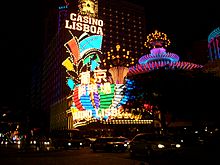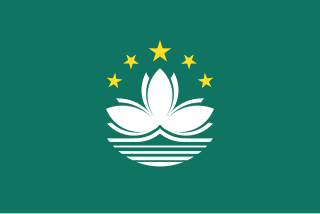
Macau or Macao is a special administrative region of the People's Republic of China. With a population of about 680,000 and a land area of 32.9 km2 (12.7 sq mi), it is the most densely populated region in the world.
Politics of Macau is a framework of a politically constrained multi-party presidential system, dominated by the People's Republic of China. It includes the legislature, the judiciary, the government, and a multi-party system. Executive power is exercised by the government, led by the Chief Executive.

The special administrative regions (SAR) of the People's Republic of China are one of four types of province-level divisions of the People's Republic of China directly under the control of its Central People's Government, being integral areas of the country. As a region, they possess the highest degree of autonomy from China's central government. However, despite the relative autonomy that the Central People's Government offers the special administrative regions, the National People's Congress and its Standing Committee remains capable of enforcing laws for the special administrative regions.
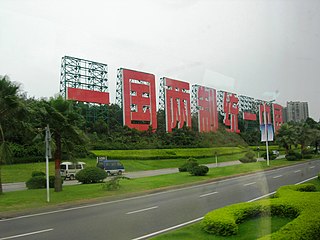
"One country, two systems" is a constitutional principle of the People's Republic of China (PRC) describing the governance of the special administrative regions of Hong Kong and Macau.

In an extradition, one jurisdiction delivers a person accused or convicted of committing a crime in another jurisdiction, over to the other's law enforcement. It is a cooperative law enforcement procedure between the two jurisdictions and depends on the arrangements made between them. In addition to legal aspects of the process, extradition also involves the physical transfer of custody of the person being extradited to the legal authority of the requesting jurisdiction.

The Chief Executive of the Macao Special Administrative Region is the head of government of Macau, a special administrative region of China. The position replaced the office of Governor of Macau, the former head of Macau as an overseas province of Portugal. Under the Basic Law of Macau, the chief executive's role is to:
...be the head of the Macau Special Administrative Region and shall represent the Region. The Chief Executive of the Macau Special Administrative Region shall be accountable to the Central People's Government and the Macau Special Administrative Region in accordance with the provisions of this Law.

Gambling in Macau has been legal since the 1850s when the Portuguese government legalised the activity in the autonomous colony. Since then, Macau has become known worldwide as the "Gambling capital of the world". It is the only place in China where casino gambling is legal.
Capital punishment is a legal penalty in China. It is applicable to offenses ranging from murder to drug trafficking. Executions are carried out by lethal injection or by shooting. A survey conducted by TheNew York Times in 2014 found the death penalty retained widespread support in Chinese society.
The Basic Law of the Macao Special Administrative Region of the People's Republic of China is the organic law that establishes the Macau Special Administrative Region, replacing the Estatuto Orgânico de Macau. It was adopted on 31 March 1993 by China's National People's Congress and promulgated by President Jiang Zemin; it came into effect on 20 December 1999, following the transfer of sovereignty over Macau from Portugal to China.

Under the Basic Law, Macau's diplomatic relations and defence are the responsibility of the central government of China. Except diplomatic relations and defence, nonetheless, Macau has retained considerable autonomy in all aspects, including economic and commercial relations, customs control.
Capital punishment in Hong Kong was formally abolished on 23 April 1993 by virtue of the Crimes (Amendment) Ordinance 1993. Before then, capital punishment was the usual sentence given since the establishment of the Crown Colony of Hong Kong for offences such as murder, kidnapping ending in death, and piracy.

The handover of Macau from the Portuguese Republic to the People's Republic of China was at midnight on 20 December 1999. This event ended 442 years of Portuguese rule in the former settlement, which began in 1557.
Articles related to Macau include:

Capital punishment in Armenia was a method of punishment that was implemented within Armenia's Criminal Code and Constitution until its eventual relinquishment in the 2003 modifications made to the Constitution. Capital punishment's origin in Armenia is unknown, yet it remained present in the Armenia Criminal Code of 1961, which was enforced and applied until 1999. Capital punishment was incorporated into Armenian legislation and effectuated for capital crimes, which were crimes that were classified to be punishable by death, including treason, espionage, first-degree murder, acts of terrorism and grave military crimes.

The Joint Declaration on the Question of Macau, or Sino-Portuguese Joint Declaration, was a treaty between Portugal and the People's Republic of China over the status of Macau. The full name of the treaty is Joint Declaration of the Government of the Portuguese Republic and the Government of the People's Republic of China on the question of Macau. Signed on 26 March 1987, the Declaration established the process and conditions of the transfer of the territory from Portuguese rule to the People's Republic of China. The Joint Declaration served also as the main source of fundamental rights that were implemented in the Basic Law of the Macau Special Administrative Region. The process was otherwise similar to the handover of Hong Kong to Chinese sovereignty by the United Kingdom in 1997.

The following outline is provided as an overview of and topical guide to Macau:

The Government of the Macau Special Administrative Region allows citizens of specific countries/territories to travel to Macau for tourism or business purposes for periods ranging from 14 to 180 days without having to obtain a visa. For other entry purposes, such as establishing residence on a long-term basis, a different policy applies.
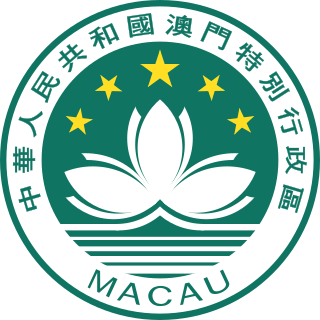
The Macau national security law is a law in Macau which prohibits and punishes acts of "treason, secession, and subversion" against the Central government, as well as "preparatory acts" leading to any of the three acts. Taken into effect on 3 March 2009, the purpose of the law is to fulfil Article 23 of the Macau Basic Law, the de facto constitution of the Macau Special Administration Region. Macau National Security Law has been in force for eleven years. Pro-Beijing state-owned Hong Kong Newspaper Wen Wei Po claimed that Macau's National Security Law "has not been used".
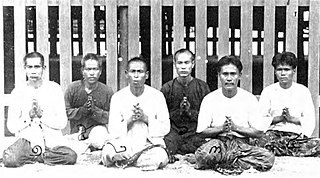
A triad is a Chinese transnational organized crime syndicate based in Greater China with outposts in various countries having significant overseas Chinese populations.

Case 3/2008 in Macau was a habeas corpus case heard before the Macau Tribunal of Ultimate Instance. The applicant A filed a request of habeas corpus to the court, as he believed his elder sister B was in unlawful detention by the Judiciary Police in Macau, when in fact B had been transferred to the Public Security Bureau of Zhuhai, China, one day before the request. The court has no jurisdiction outside Macau, so it ruled that there was no further need to adjudicate, on grounds of supervening impossibility of the remedy sought. The judgment, however, went on to cite a previous decision by the same court in 2007, which allowed a similar application. The court this time reiterated that before specific legislation is introduced, it is illegal to transfer fugitives to mainland China, and the acts by the authority in the present case "discredit justice, undermine the Rechtsstaat and do not bring prestige to the Macau Special Administrative Region." The case has since been cited by jurists in academic papers concerning the lack of extradition legislation between Macau and mainland China.

